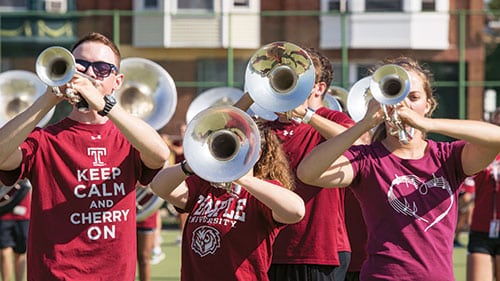
Mental health has been deemed an important part of each person’s well-being (Copeland et al., 2021). In schools everywhere, students’ mental health has been a recent concern for parents, teachers, and administrators. This concern is well founded as numerous researchers note how heightened anxiety, depression, and stress have been observed in students, particularly after the recent pandemic (Payne, 2023). Anecdotally, ensemble directors have noticed that students seem different post-pandemic and absences have risen.
While access to official and professional resources is often the first step to addressing immediate concerns, there are other ways that directors can assist students and serve as a positive moderator between life experiences and good mental health. Recently, at a College Band Directors National Association Athletic Bands Symposium, I had the pleasure of serving on a panel discussion centered on the mental health of students in marching bands. Marching band students often spend significant time together, socializing with peers and forming a sense of belonging. It is through this sense of belonging that students can establish a support system for difficult times. In the panel discussion, I had the opportunity to discuss with colleagues the many ways that marching band directors can assist in students’ good mental health. A collection of ideas from each member of the panel is presented below.
Justin R. Stolarik
Panel Moderator/Director of Bands
Stony Brook University
At Stony Brook University’s band camp, all new members are matched with a small family of returning members, based on interests. At many schools around the country, the terminology surrounding first-year or freshman members has shifted away from words like “rookie” members. Words do matter, particularly to the current generation of students, and this change alone may reduce any stigma and stress that can be associated with prior verbiage. This helps new members feel like they belong from the first day, instead of struggling to fit in socially and musically with older students.
Band camp activities in The Spirit of Stony Brook also include evening social events that help sections build cohesiveness. Presentations by campus representatives, specifically from the office of Counseling and Psychological Services, are also held during camp. These sessions are vital to the conversations about resources available on campus, including mental health and social programming outside of the band.
Once the regular season begins, the band social committee organizes movie nights, game nights, and other events, with support from music organizations such as Kappa Kappa Psi. The band continues mental health conversations and support for students throughout the season. Additional activities that create a sense of belonging include: themed rehearsal days, October pumpkin carving/painting contests, and an end-of-season festival featuring student solo and ensemble performances, and a catered meal chosen by students.
Matthew Brunner
Director of Athletic Bands
Temple University
At Temple University, the Diamond Marching Band directors and staff stay in contact with first-year members throughout the summer, primarily through virtual meetings. These sessions let new students know about band program expectations, how to prepare, and where to go to have questions answered. The directors want to be approachable and be seen as safe people when students need assistance, band-related or not.
During student leadership training, section leaders are recognized as a first line of defense for identifying peers who may be struggling. Student leaders have more regular contact with their peers than directors do. For this reason, student leaders receive information about available services through presentations from campus representatives. Specifically, section leaders participate in role-playing exercises led by counseling center staff to help recognize who needs help and what to do. This training prepares student leaders to assist directors in safeguarding mental health.
During band camp, students are placed into academic support groups made up of students from the same major. This approach, used by other schools in this article, strengthens communication and bonding between students who share a common academic major or focus.
Once the season begins, students are officially allowed two mental health days to take a break as needed, except on the day of or the day before a performance. Additionally, section leaders send out anonymous check-ins to their sections to see how everyone is doing and solicit general feedback as the season progresses.
Tremon Kizer
Associate Director of Bands
University of Central Florida
During the summer, the UCF Marching Knights student leaders communicate with new and returning students by writing introduction letters that highlight what they are excited about in the upcoming season and hosting online meetings. These efforts create a sense of togetherness and belonging within the band and university. As found by Stewart (2005), students’ self-efficacy and relationship with others in band is important to their future enrollment.
At UCF, a buddy system is used that pairs new and returning members. Often, older students have connections with alumni working in the music profession who can serve as positive role models and provide yet another touch point for students to communicate with and discuss the current and future challenges of their academic majors. University personnel hold sessions with the entire band on conflict resolution, dealing with differences, and celebrating the diversity of the ensemble.
Music programming is also vital for making connections between the curriculum and students. Just as with concert ensembles, it is important for marching bands to rehearse and program a variety of music that resonates with each person in the ensemble. This can include music originally written and performed by diverse artists or music arranged by people who can create authentic treatments of existing music. Band members appreciate directors who recognize students’ unique backgrounds in order to make meaningful and musical connections together.
In the regular marching season, the daily grind of rehearsals, changing performance themes, and high-profile performances, along with additional academic rigors outside of band, can take a toll on students. At UCF, the band allows for one full week of no rehearsals, which provides time for students to focus on community service, rest, and other academic work.
Additionally, a student advisory board creates several activities (Olympic games, online game nights, community service projects, and kickball/dodgeball tournaments). A newsletter distributed every few weeks features band sections, individual members, upcoming events, recipes, and other fun facts about the band and university. Finally, drum majors monitor an online form asking how students are doing so directors and staff can keep a pulse on them.
Amy M. Knopps
Associate Director of Bands
University of Missouri
Each year, the Marching Mizzou (M2) first addresses the mental health of students through spring training leadership sessions. During these sessions, students meet in groups, large and small, to discuss and evaluate the band’s mental health plan and identify areas needing improvement before each season. By meeting in small student-led groups, ideas can be discussed freely without directors present. Later, these ideas or concerns are brought to directors to enact a plan of action.
The band also has several student committees that assist the directors’ vision of the band’s health plan including the Health and Wellness Committee; Inclusion, Diversity and Equity Committee; Recruitment and Outreach Committee; Movement Committee, and others. These committees give a sense of ownership to the entire band.
New members of the band are introduced to returning members as soon as possible, often in the spring during music events hosted on campus, such as state music assessments. M2 members are instructed to go to the events of their new members to meet and support them in their performances. Meeting them and showing that level of support has been a valuable strategy to decrease new member mental stress during the transition to college.
Throughout the season, a “Resource of the Day” is frequently shared during rehearsals. These 30-second presentations share information about the range of mental health and campus health resources available to students. Often, representatives from those resources are present after rehearsals for student engagement. These tools are also shared on the band’s social media accounts. Additionally, the year 2024 marks M2’s 4th annual mental health day where the band dedicates an entire class period for students to focus on mental health and complete self-care activities. During this day, students are also given help to connect with campus health resources as needed.
Finally, students are given outlets and latitude to contribute new and creative ideas that can improve the band’s physical and mental health. In M2, such ideas have led to summer cardio contests tracked via phone apps, general marching health, advance distribution of rehearsal plans, and shared mental health and physical fitness videos from YouTube.
Jason Cumberledge
Director of Athletic Bands
University of Louisville
Schools should be prepared to address the continued mental health impacts of the recent pandemic. Band directors must be familiar with school and local resources for students’ good physical and mental health.
The Cardinal Marching Band assists students by prioritizing mental and physical health-related services and resources to support academic success. However, I do ask that students take ownership of their health because band directors are typically not mental health experts. This year we have added a Health and Wellness Committee as part of the student leadership team. Recently, we founded a health and wellness committee in our marching band. A draft of the committee’s mission statement is:
The Health and Wellness committee acts as an advisory role to the directors and teaching assistants of the Cardinal Marching Band. We strive to bring attention to health and wellness concerns by informing members on preventative measures and provide resources that will benefit and assist in this process. We will organize events that cater to these subjects and take in feedback from the community on improving this process in order to accommodate, inform, and give back to the band for their time and personal sacrifices that help the band be successful.
As the director, I maintain open lines of communication and an open-door policy. Open communication may not produce monumental conversations, but it is important for students to have directors who care about them. Remind students that this area of communication is a judgment free zone. In a study focused on best practices for students’ mental health, Jääskeläinen et al. (2023) recommended that students receive opportunities for orientation to academic studies, school counseling, encouragement of feedback, and stress and time management skills.
* * *
I would like to thank each director who contributed to this article. Often, we can gain the most by discussion with colleagues, and serving on a panel discussion with the outstanding and accomplished directors above is no exception. Clearly, many of these suggestions can generally be provided by the front offices at schools, but directors can implement these concepts in our programs as well, particularly in welcoming feedback on band operations so mental health remains a priority and is established in all facets of the organization. While these collected ideas are presented in the context of college marching, many of them can be instituted in marching band programs of all levels.
* * *
Band photos courtesy of Temple University
Interested readers are invited to continue discussions about students’ mental health via email:
Jason Cumberledge: cumberledge@gocards.com
Justin Stolarik: justin.stolarik@stonybrook.edu
Matthew Brunner: matt.brunner@temple.edu
Tremon Kizer: tkizer@ucf.edu
Amy M. Knopps: knoppsa@missouri.edu
References
Copeland, W.E., McGinnis, E., Bai, Y., Adams, Z., Nardone, H., Devadanam, V., … & Hudziak, J.J. (2021). Impact of COVID-19 pandemic on college student mental health and wellness. Journal of the American Academy of Child & Adolescent Psychiatry, 60(1), 134–141. https://doi.org/10.1016/j.jaac.2020.08.466
Jääskeläinen, T., López-Íñiguez, G., & Phillips, M. (2023). Music students’ experienced workload in higher education: A systematic review and recommendations for good practice. Musicae Scientiae, 27(3), 541–567. https://doi.org/10.1177/10298649221093976
Payne, P.D. (2023). Music education majors and mental health: A follow-up study. Research and Issues in Music Education, 17(1), 1–50. https://files.eric.ed.gov/fulltext/EJ1382962.pdf
Stewart, J.L. (2005). Factors related to students’ decisions to continue in band. Contributions to Music Education, 32(1), 59–74. https://www.jstor.org/stable/24127236





